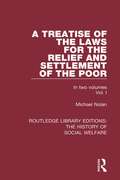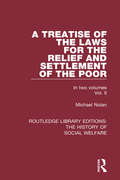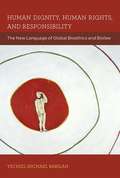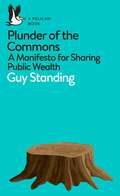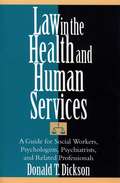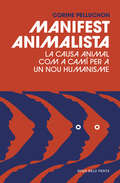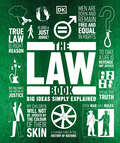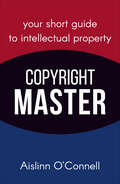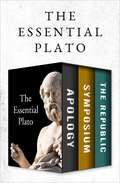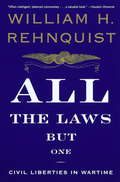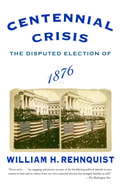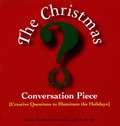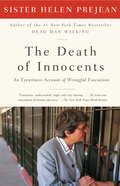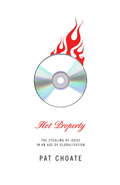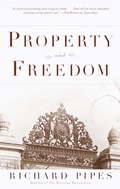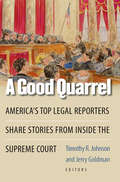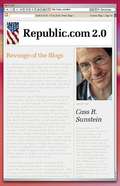- Table View
- List View
A Treatise of the Laws for the Relief and Settlement of the Poor: Volume I (Routledge Library Editions: The History of Social Welfare)
by Michael NolanFirst published in 1805, this work summarises the vast array of laws at the time on the relief of the poor in Great Britain. Split across two volumes, it not only condenses the laws themselves but also disentangles the theory and doctrine of each law and explains how the theory should have been applied in practice. This work will be a valuable primary source for those studying 19th poor relief and welfare.
A Treatise of the Laws for the Relief and Settlement of the Poor: Volume II (Routledge Library Editions: The History of Social Welfare)
by Michael NolanFirst published in 1805, this work summarises the vast array of laws at the time on the relief of the poor in Great Britain. Split across two volumes, it not only condenses the laws themselves but also disentangles the theory and doctrine of each law and explains how the theory should have been applied in practice. This work will be a valuable primary source for those studying 19th poor relief and welfare.
Human Dignity, Human Rights, and Responsibility
by Yechiel Michael Barilan"Human dignity" has been enshrined in international agreements and national constitutions as a fundamental human right. The World Medical Association calls on physicians to respect human dignity and to discharge their duties with dignity. And yet human dignity is a term--like love, hope, and justice--that is intuitively grasped but never clearly defined. Some ethicists and bioethicists dismiss it; other thinkers point to its use in the service of particular ideologies. In this book, Michael Barilan offers an urgently needed, nonideological, and thorough conceptual clarification of human dignity and human rights, relating these ideas to current issues in ethics, law, and bioethics. Combining social history, history of ideas, moral theology, applied ethics, and political theory, Barilan tells the story of human dignity as a background moral ethos to human rights. After setting the problem in its scholarly context, he offers a hermeneutics of the formative texts on Imago Dei; provides a philosophical explication of the value of human dignity and of vulnerability; presents a comprehensive theory of human rights from a natural, humanist perspective; explores issues of moral status; and examines the value of responsibility as a link between virtue ethics and human dignity and rights. Barilan accompanies his theoretical claim with numerous practical illustrations, linking his theory to such issues in bioethics as end-of-life care, cloning, abortion, torture, treatment of the mentally incapacitated, the right to health care, the human organ market, disability and notions of difference, and privacy, highlighting many relevant legal aspects in constitutional and humanitarian law.
Plunder of the Commons: A Manifesto for Sharing Public Wealth (Pelican Books)
by Guy Standing'One of the most important books I've read in years' Brian EnoWe are losing the commons. Austerity and neoliberal policies have depleted our shared wealth; our national utilities have been sold off to foreign conglomerates, social housing is almost non-existent, our parks are cordoned off for private events and our national art galleries are sponsored by banks and oil companies. This plunder deprives us all of our common rights, recognized as far back as the Magna Carta and the Charter of the Forest of 1217, to share fairly and equitably in our public wealth.Guy Standing leads us through a new appraisal of the commons, stemming from the medieval concept of common land reserved in ancient law from marauding barons, to his modern reappraisal of the resources we all hold in common - a brilliant new synthesis that crystallises quite how much public wealth has been redirected to the 1% in recent decades through the state-approved exploitation of everything from our land to our state housing, health and benefit systems, to our justice system, schools, newspapers and even the air we breathe. Plunder of the Commons proposes a charter for a new form of commoning, of remembering, guarding and sharing that which belongs to us all, to slash inequality and soothe our current political instability.
Law in the Health and Human Services
by Donald T. DicksonProfessor Dickson provides students with examples of a legal way of thinking about significant issues in social policy. This book can be used in policy and practice courses in the fields of mental health, child welfare, the family, developmental and physical disabilities, and professional ethics. Provides excellent selection of relevant court decisions along with clearly articulated questions and issues for discussion.
Manifest animalista: La causa animal com a camí per a un nou humanisme
by Corine PelluchonLa violència contra els animals és un atac directe a la nostra humanitat. Això demostra Corine Pelluchon en aquest breu, pragmàtic, i controvertit assaig que suposa una contribució radical a l'ètica i la filosofia política. Lluitar contra el maltractament animal és rebel·lar-se contra una societat basada en l'explotació, i per això la causa animalista és una qüestió política major que ens concerneix a tots, més enllà d'ideologies o conflictes d'interessos. Amb un estil viu, persuasiu i inspirador, l'autora proposa un camí possible i factible per portar aquest debat a l'esfera política amb tanta claredat i urgència com sigui possible. Ressenyes:«Corine Pelluchon ho explica tot absolutament bé en tot just un centenar de pàgines: per ser una alternativa vàlida, és imprescindible polititzar la causa animal.»Luce Lapin, Charlie Hebdo «L'objectiu principal de l'autora està completament assolit en aquest Manifest animalista: dóna al lector les claus que li permetran ampliar el radi d'acció de l'humanisme als animals.»Philippe Douroux, Libération «Una perspectiva bella i ambiciosa.»Isabelle Gravillon, Femme Majuscule «Un llibre d'intervenció política, tan compromès com lúcid.»Robert Jules, La Tribune «Una de les moltes i grans qualitats d'aquest Manifest animalista és que, en tot moment, el seu projecte està exposat de manera perfectament creïble i realitzable. Precisament per això, l'autora no es fa cap il·lusió sobre la dificultat que suposa introduir la qüestió animal en el debat polític.»Hicham-Stéphane Afeissa, Non Fiction
The Law Book (DK Big Ideas)
by DKLearn about the most important legal milestones in history in The Law Book.Part of the fascinating Big Ideas series, this book tackles tricky topics and themes in a simple and easy to follow format. Learn about Law in this overview guide to the subject, great for novices looking to find out more and experts wishing to refresh their knowledge alike! The Law Book brings a fresh and vibrant take on the topic through eye-catching graphics and diagrams to immerse yourself in. This captivating book will broaden your understanding of Law, with:- More than 90 ground-breaking legal milestones- Packed with facts, charts, timelines and graphs to help explain core concepts- A visual approach to big subjects with striking illustrations and graphics throughout- Easy to follow text makes topics accessible for people at any level of understandingThe Law Book is a captivating introduction to the legal precedents, and religious, political, and moral codes that have shaped the world we live in, aimed at adults with an interest in the subject and students wanting to gain more of an overview. Discover the most important milestones in legal history, from the Code of Hammurabi to groundbreaking legislation including Magna Carta and the Abolition of the Slave Trade Act, all through exciting text and bold graphics.Your Law Questions, Simply ExplainedThis engaging overview goes into legal history across the world, all the way into the 21st century, with copyright in the digital age, same-sex marriage, and the &“right to be forgotten&”. If you thought it was difficult to learn about legislations and legal history, The Law Book presents key information in an easy to follow layout. Learn about the most important breakthroughs, like the fight for universal suffrage and workers&’ rights, and the establishment of international legal bodies like INTERPOL and the European Court of Justice.The Big Ideas SeriesWith millions of copies sold worldwide, The Law Book is part of the award-winning Big Ideas series from DK. The series uses striking graphics along with engaging writing, making big topics easy to understand.
Copyright Master
by Aislinn O'ConnellThe perfect distillation of everything you need to know about copyright law.Covering everything from copyright’s early history to the protection of cutting-edge software, Copyright Master is a concise, practical guide through the labyrinth of licensing and intellectual property.Whether by explaining the Creative Commons system, providing a useful guide to takedown notices, or examining the process for licensing orphan works, Copyright Master forms an ideal primer. It will help you use content imaginatively and judiciously, detailing what you can do without licences, including fair use, American legislation and recent amendments to British fair dealing rules. Finally, Copyright Master looks into the future of this rapidly-changing field and examines how the EU’s Digital Single Market strategy will shape digital copyright in the years to comePacked with tips, links, and other practical information, this is an essential guide for anyone wanting to create and use copyright with confidence.
The Essential Plato: Apology, Symposium, and The Republic
by PlatoThree Socratic dialogues by the ancient Greek philosopher who established the foundations of Western thought. Apology: In this classic text, Plato recounts the trial of his mentor Socrates, who stands accused of rejecting the gods and corrupting the youth of Athens. As recounted by Plato, Socrates defends himself with a profound examination of integrity, citizenship, the nature of truth, and the role of a philosopher. Symposium: Here Plato depicts a group of Athenian intellectuals discussing the nature of desire. One after another, Agathon, Aristodemus, Eryximachus, Pausanias, and Aristophanes share their perspectives on gender, love, sexuality, and human instincts. The dialogue culminates in the radical views of Socrates, who advocates transcendence through spiritual worship. The Republic: Plato&’s magnum opus is a wide-ranging and deeply influential meditation on society as a whole. Plato explores the concept of justice, the connection between politics and psychology, the difference between words and what they represent, and the roles of art and education, among many other topics.
All the Laws but One
by William H. RehnquistInAll the Laws but One, William H. Rehnquist, Chief Justice of the United States, provides an insightful and fascinating account of the history of civil liberties during wartime and illuminates the cases where presidents have suspended the law in the name of national security. Abraham Lincoln, champion of freedom and the rights of man, suspended the writ of habeas corpus early in the Civil War--later in the war he also imposed limits upon freedom of speech and the press and demanded that political criminals be tried in military courts. During World War II, the government forced 100,000 U. S. residents of Japanese descent, including many citizens, into detainment camps. Through these and other incidents Chief Justice Rehnquist brilliantly probes the issues at stake in the balance between the national interest and personal freedoms. WithAll the Laws but Onehe significantly enlarges our understanding of how the Supreme Court has interpreted the Constitution during past periods of national crisis--and draws guidelines for how it should do so in the future.
Centennial Crisis
by William H. RehnquistNear midnight on Election Day in November 1876, the returns coming into Republican National headquarters signaled a victory for the Democratic presidential candidate, Samuel J. Tilden. But alert Republican leaders saw that if all the states still doubtful or disputed went for their candidate, Rutherford B. Hayes would be elected. Word was sent out to four southern states that their returns were crucial for a Hayes victory. Thus Chief Justice William Rehnquist begins this remarkable account of one of American's greatest political dramas, a crisis that was not resolved for nearly four months, on March 2, 1877, only two days before Inauguration Day. In his gripping story, Rehnquist tells how each party maneuvered to buy votes in the southern states, how the country slid into Congressional, judicial and public turmoil, and how the creation in January of an Electoral Commission (comprised of five Democrats, five Republicans and five Supreme Court justices) was opposed by both candidates. When that body's deciding vote was cast by Justice Joseph Bradley, public outcry reached such a fever pitch that the presidential swearing-in had to be held on a Sunday in near secrecry. Reaching beyond the history of a contentious election, the Chief Justice describes the political climate and economy of America in the 1870's, packing his narrative with biographical sketches of the central participants and opening a window on events in that decade that have long been overlooked. In a compelling epilogue we learn the occasions when Presidents, ranging from George Washington to Lyndon Johnson, have asked Supreme Court justices to arbitrate disputes, settle treaties or serve on investigating commissions. Almost always the justices were berated and attacked for their decisions. Would it be better for them to have refused the president’s request? The Chief Justice has some surprising answers.
Christmas Conversation Piece
by Bret Nicholaus Paul LowrieWhat one Christmas tradition would you never want to give up? If you could spend Christmas anywhere in the world, where would you most want to be? If you could have visited the Christ child just as the Three Kings did, what would you have brought as a gift? You've been chosen to host a sensational Christmas celebration on TV: What three guests would you choose to make it the best Christmas special ever? The Christmas Conversation Pieceoffers these and many other questions to pose and ponder during a season of both deep reflection and unabashed merriment. This charming volume--the perfect stocking stuffer--will provide you, your family, and your friends with twelve days of surprising and amusing Yuletide questions. Who would you most like to meet under the mistletoe? Your answer just may change by Christmas Eve!
The Death of Innocents
by Helen PrejeanFrom the author of the national bestseller Dead Man Walking comes a brave and fiercely argued new book that tests the moral edge of the debate on capital punishment: What if we're executing innocent men? Two cases in point are Dobie Gillis Williams, an indigent black man with an IQ of 65, and Joseph Roger O'Dell. Both were convicted of murder on flimsy evidence (O'Dell's principal accuser was a jailhouse informant who later recanted his testimony). Both were executed in spite of numerous appeals. Sister Helen Prejean watched both of them die.As she recounts these men's cases and takes us through their terrible last moments, Prejean brilliantly dismantles the legal and religious arguments that have been used to justify the death penalty. Riveting, moving, and ultimately damning, The Death of Innocents is a book we dare not ignore.From the Trade Paperback edition.ng on the forensic evidence, which he claimed would exonerate him, but the courts refused. After his execution on July 23, 1997, the state destroyed the evidence. As a result, its conviction of O'Dell could never be scrutinized. "The reader of this book will be the first 'jury' with access to all the evidence the trial juries never saw," says Prejean, who accompanied both men to their executions. By using the withheld evidence to reconstruct the crimes for which these two men were convicted, Prejean shows how race, prosecutorial ambition, poverty, election cycles, and publicity play far too great a role in determining who dies and who lives.Prejean traces the historical underpinnings of executions in this country, demonstrating that it is no accident that over 80 percent of executions in the past twenty-five years have been carried out in the former slave states. She also raises profound constitutional questions about an appeals system that decides most death cases on procedural grounds without ever examining their merits.To date, 113 wrongfully convicted persons have been freed from death row. If constitutional protections-due process, assistance of counsel, and equal justice under law-are truly being respected, how is it possible that these people were convicted in the first place? And how can we accept a system so rife with error?Sister Helen Prejean takes us with her on her spiritual journey as she accompanies two possibly innocent human beings to their deaths at the hands of the state. Prejean implores us to reflect on what is perhaps the core moral issue of the death penalty debate: Honorable people disagree about the justice of executing the guilty, but can anyone argue about the injustice of executing the innocent?From the Hardcover edition.
Hot Property: The Stealing of Ideas in an Age of Globalization
by Pat ChoateAuthor of several books on US society and economics, and running mate of Ross Perot in the 1996 presidential election, Choate examines the roots of conflicts over intellectual property and how the establishment of patent and copyright protections helped propel the US economy. He also traces the emergence of Germany, Japan, and China as rivals to the US through copying, counterfeiting, and underpricing American products and media. Annotation ©2004 Book News, Inc. , Portland, OR (booknews. com)
Property and Freedom
by Richard PipesProperty, asserts Richard Pipes, is an indispensable ingredient not only of economic progress but also of liberty and the rule of law. In his new book, the Harvard scholar demonstrates how, throughout history, private ownership has served as a barrier to the power of the state, enabling the Western world to evolve enduring democratic institutions. He traces the development of private property, beginning with ancient Greece and Rome, where property rights in the modern sense first made their appearance. He explains how notions of ownership matured in late medieval times with the great expansion of commerce and the growth of cities. He shows how England, as the first country to treat land as a commodity and to develop a robust defense of property rights, also became the first to institute a parliamentary government capable of restraining the powers of royalty. In pre-nineteenth-century Russia, on the other hand, the absence of private land ownership deprived its citizens of the leverage to limit the authority of their tsars. Pipes describes the attitudes toward property of twentieth-century totalitarian states and points out that in the United States the protection of private property, rooted in the principles of the Founding Fathers, has been a major contributor to the commonweal. However, he warns that contemporary trends in the treatment of property--in a century that, he suggests, has been unfavorable to the institution--threaten to undermine the rights of citizens. And he makes clear why he believes that excessive interference by government, even when intended to promote the "common good," could lead to a diminution of freedom.
A Good Quarrel: America's Top Legal Reporters Share Stories from Inside the Supreme Court
by Timothy R. Johnson Jerry GoldmanWhile reading what top legal reporters say about some of the most important U. S. Supreme Court oral arguments in recent history, go to www. goodquarrel. com to listen to audio and hear for yourself the very style and delivery of the oral arguments that have shaped the history of our nation's highest law. See Preface for full instructions. Contributors Charles Bierbauer, CNN Lyle Denniston, scotusblog. com Fred Graham, Court TV Brent Kendall,Los Angeles Daily Journal Steve Lash,Houston Chronicle Dahlia Lithwick, Slate. com Tony Mauro, American Lawyer Media Tim O'Brien, ABC News David Savage,Los Angeles Times Greg Stohr, Bloomberg News Nina Totenberg, NPRTimothy R. Johnson teaches in the Department of Political Science and the Law School at the University of Minnesota. Jerry Goldman teaches political science at Northwestern University and directs the OYEZ Project, a multimedia archive devoted to the Supreme Court, at www. oyez. org . Cover sketch by Dana Verkouteren"Supreme Court oral arguments are good government in action. A Good Quarrelbrilliantly showcases this important aspect of the Court's work. " ---Paul Clement, Partner, King & Spalding, and former United States Solicitor General"Few legal experiences are as exhilarating as a Supreme Court oral argument---a unique art form that this superb collection brings vividly to life. " ---Kathleen Sullivan, Partner, Quinn Emanuel Urquhart Oliver and Hedges, and former Dean, Stanford Law School"[A Good Quarrel] shines a brilliant spotlight on the pivotal moment of advocacy when the Supreme Court confronts the nation's most profound legal questions. " ---Thomas C. Goldstein, Partner, Akin Gump, and Lecturer, Supreme Court Litigation, Harvard Law School and Stanford Law School"A brilliant way to understand America's most important mysterious institution. " ---Lawrence Lessig, Stanford Law School
Estate Planning 101: From Avoiding Probate and Assessing Assets to Establishing Directives and Understanding Taxes, Your Essential Primer to Estate Planning (Adams 101)
by Vicki Cook Amy BlacklockDiscover the ins and outs of planning your own or your loved one&’s last wishes with this easy-to-understand guide to estate planning.No one likes to talk about death, but being prepared for any unexpected tragedy can help your loved ones navigate your loss more easily in the long run. From creating your advanced medical directives to designating your beneficiaries, estate planning can ensure that your wishes are carried out when you are no longer around. With Estate Planning 101, you can get your affairs in order before any unfortunate incident occurs. This easy-to-understand guide comes with detailed information on what needs to be done to protect your estate. With information on creating a living will, minimizing estate taxes, choosing an executor, and more, you will be prepared for the future, no matter what it brings. Estate Planning 101 offers you step-by-step instructions and checklists to keep you organized for whatever life throws your way.
Republic.com 2.0
by Cass R. SunsteinWhat happens to democracy and free speech if people use the Internet to listen and speak only to the like-minded? What is the benefit of the Internet's unlimited choices if citizens narrowly filter the information they receive? Cass Sunstein first asked these questions in 2001'sRepublic. com. Now, inRepublic. com 2. 0, Sunstein thoroughly rethinks the critical relationship between democracy and the Internet in a world where partisan Weblogs have emerged as a significant political force. Republic. com 2. 0highlights new research on how people are using the Internet, especially the blogosphere. Sunstein warns against "information cocoons" and "echo chambers," wherein people avoid the news and opinions that they don't want to hear. He also demonstrates the need to regulate the innumerable choices made possible by technology. His proposed remedies and reforms emphasize what consumers and producers can do to help avoid the perils, and realize the promise, of the Internet.
